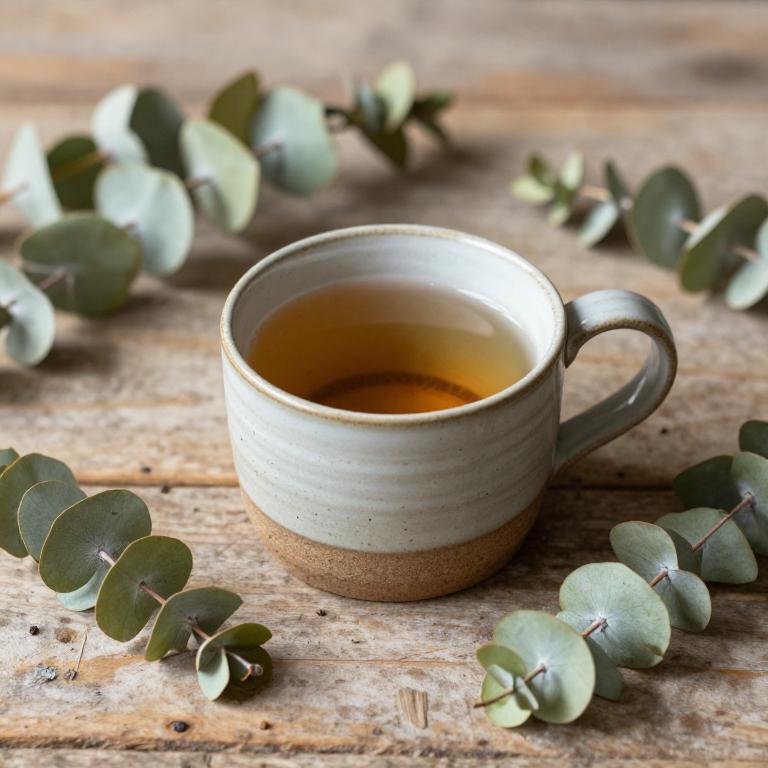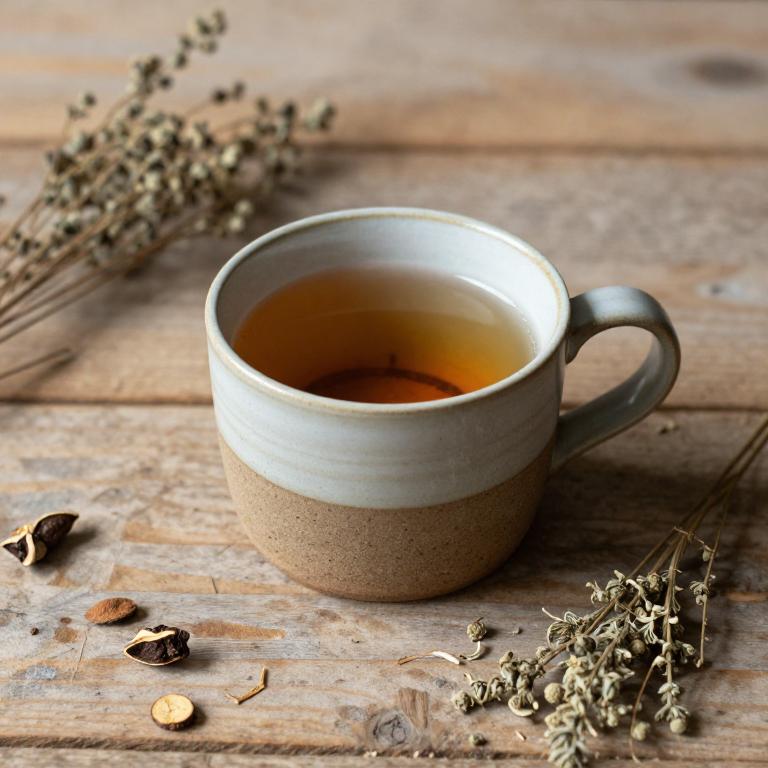10 Best Herbal Teas For Phlegm

Herbal teas can be a natural and effective way to help reduce phlegm and ease respiratory discomfort.
Ingredients like ginger, eucalyptus, and thyme are commonly used in herbal teas due to their anti-inflammatory and expectorant properties. These teas work by loosening mucus in the airways and promoting its expulsion from the body. Drinking warm herbal teas can also soothe the throat and reduce irritation caused by excess phlegm.
However, it's important to consult with a healthcare professional before using herbal remedies, especially for persistent or severe respiratory symptoms.
Table of Contents
- 1. Eucalyptus (Eucalyptus globulus)
- 2. Thyme (Thymus vulgaris)
- 3. Fennel (Foeniculum vulgare)
- 4. Peppermint (Mentha piperita)
- 5. Licorice (Glycyrrhiza glabra)
- 6. Salvia (Salvia officinalis)
- 7. Ginger (Zingiber officinale)
- 8. Rosemary (Rosmarinus officinalis)
- 9. Ceylon cinnamon (Cinnamomum verum)
- 10. Chamomile (Matricaria chamomilla)
1. Eucalyptus (Eucalyptus globulus)

Eucalyptus globulus, commonly known as the Australian eucalyptus, is widely used in herbal teas to help alleviate symptoms associated with phlegm production.
The essential oils found in eucalyptus leaves, particularly cineole, have expectorant properties that can loosen mucus and make it easier to expel from the respiratory tract. These teas are often recommended for individuals suffering from colds, bronchitis, or other respiratory conditions where excess phlegm is a common issue. Drinking eucalyptus globulus tea can also help reduce inflammation in the airways and provide a soothing effect on the throat.
However, it is important to consult with a healthcare professional before using this herb, especially for those with allergies or existing medical conditions.
2. Thyme (Thymus vulgaris)

Thymus vulgaris, commonly known as thyme, is a popular herb used in herbal teas to help alleviate symptoms associated with phlegm and respiratory congestion.
The essential oils in thyme, particularly thymol, possess antimicrobial and expectorant properties that can help loosen mucus and ease coughing. Thyme tea is often recommended for its ability to soothe sore throats and reduce the thickness of phlegm, making it easier to expel. To prepare thyme tea for phlegm, steep a teaspoon of dried thyme in hot water for several minutes.
While generally safe, it is advisable to consult a healthcare provider before using thyme tea, especially for individuals with allergies or chronic respiratory conditions.
3. Fennel (Foeniculum vulgare)

Foeniculum vulgare, commonly known as fennel, is often used in herbal teas to help alleviate symptoms associated with phlegm and respiratory congestion.
The seeds of the fennel plant contain compounds such as anethol and limonene, which have expectorant properties that can help loosen and expel mucus from the respiratory tract. When brewed into a tea, fennel can soothe the throat and reduce irritation caused by excess phlegm. It is often recommended as a natural remedy for conditions like bronchitis or the common cold, where phlegm production is a concern.
However, it is important to consult with a healthcare provider before using fennel tea, especially for individuals with allergies or those taking medications.
4. Peppermint (Mentha piperita)

Mentha piperita, commonly known as peppermint, is a popular herb used in herbal teas to help alleviate symptoms associated with phlegm and respiratory congestion.
The essential oils in peppermint, particularly menthol, have soothing and decongestant properties that can help reduce mucus buildup and ease breathing. When brewed into a tea, peppermint can act as a natural expectorant, helping to loosen and expel phlegm from the respiratory tract. Its refreshing taste and calming effects make it a comforting choice for those suffering from colds, coughs, or bronchitis.
However, it is advisable to consult a healthcare professional before using peppermint tea, especially for individuals with gastrointestinal sensitivities or chronic health conditions.
5. Licorice (Glycyrrhiza glabra)

Glycyrrhiza glabra, commonly known as licorice root, has been traditionally used in herbal teas to help alleviate symptoms related to phlegm and respiratory congestion.
The active compound, glycyrrhizin, possesses anti-inflammatory and expectorant properties that can help loosen mucus and ease its removal from the airways. When consumed as a tea, licorice root may soothe irritated throats and reduce the thickness of phlegm, making it easier to cough up. However, long-term use of licorice root tea should be approached with caution, as it may cause side effects such as increased blood pressure or fluid retention.
It is advisable to consult a healthcare professional before using licorice root tea, especially for individuals with pre-existing health conditions.
6. Salvia (Salvia officinalis)

Salvia officinalis, commonly known as sage, has been traditionally used in herbal teas to help alleviate symptoms associated with excess phlegm.
The plant contains compounds such as thujone and flavonoids, which may have antimicrobial and anti-inflammatory properties that support respiratory health. When brewed into a tea, sage can help reduce mucus production and ease congestion by soothing the throat and reducing inflammation in the airways. It is often recommended as a natural remedy for colds, coughs, and bronchitis due to its expectorant effects.
However, it is important to consult a healthcare professional before using sage tea, especially for prolonged periods or in combination with other medications.
7. Ginger (Zingiber officinale)

Zingiber officinale, commonly known as ginger, is a popular herbal ingredient used in teas to help alleviate symptoms associated with phlegm.
The active compounds in ginger, such as gingerol and shogaol, possess anti-inflammatory and bronchodilatory properties that can reduce mucus production and ease respiratory congestion. Ginger tea is often recommended as a natural remedy for colds, flu, and other respiratory infections where phlegm is a common symptom. Its warming effect can also help soothe the throat and promote easier breathing.
When consumed regularly, ginger tea may support the body's natural processes in clearing excess mucus and improving overall respiratory health.
8. Rosemary (Rosmarinus officinalis)

Rosmarinus officinalis, commonly known as rosemary, is a fragrant herb often used in herbal teas to support respiratory health.
While rosemary itself is not traditionally used specifically for phlegm, it can help reduce mucus buildup and ease congestion when consumed as a tea. The essential oils in rosemary, such as camphor and cineole, have expectorant properties that may help loosen phlegm and promote easier breathing. To prepare a rosemary tea, steep fresh or dried leaves in hot water for several minutes. It is often combined with other herbs like thyme or eucalyptus to enhance its effectiveness for respiratory support.
However, it is advisable to consult a healthcare professional before using rosemary tea, especially for those with chronic respiratory conditions or during pregnancy.
9. Ceylon cinnamon (Cinnamomum verum)

Cinnamomum verum, commonly known as true cinnamon, is often used in herbal teas to help alleviate symptoms associated with excess phlegm.
The essential oils in cinnamon, particularly cinnamaldehyde, possess antimicrobial and anti-inflammatory properties that can help reduce mucus production and ease congestion. When brewed into a warm tea, cinnamon can soothe the respiratory tract and provide a warming effect that may help loosen phlegm. It is often combined with other herbs like ginger or eucalyptus to enhance its effectiveness in respiratory support.
However, it is important to consult a healthcare professional before using cinnamon tea, especially for individuals with chronic respiratory conditions or allergies.
10. Chamomile (Matricaria chamomilla)

Matricaria chamomilla, commonly known as chamomile, is a popular herbal tea often used for its calming and anti-inflammatory properties.
While it is well-known for aiding sleep and reducing stress, chamomile tea may also help alleviate symptoms associated with excess phlegm by soothing the respiratory tract and reducing mucus production. The essential oils in chamomile, such as bisabolol and chamazulene, possess mild expectorant and antispasmodic effects that can ease congestion and promote easier breathing. However, it is important to note that chamomile is not a primary treatment for chronic phlegm or respiratory infections, and it should be used as a complementary remedy under the guidance of a healthcare professional.
Overall, chamomile tea can be a gentle and soothing option for those seeking natural relief from mild phlegm-related discomfort.